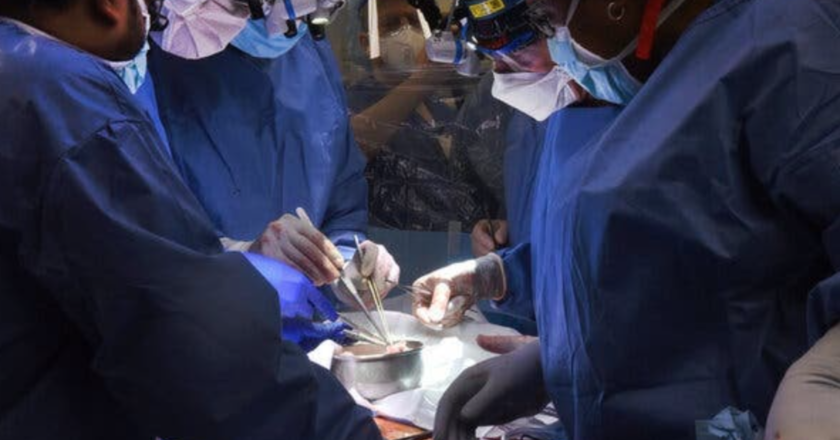On Jan. 7, 2022, a surgical team at a hospital in Maryland performed a groundbreaking experimental surgery. David Bennett, a 57-year-old man with a devitalizing and fatal heart condition, opted to receive an experimental heart transplant using a genetically modified pig heart. The heart was engineered at the University of Maryland Medical Center to ensure Bennett’s body would not reject the new organ.
While to some, an organ transplant using the heart of an animal from a different species may seem too risky, Bennett felt he had very little to lose. Bennet had a life threatening disease and was also ineligible for a human heart transplant; therefore, this surgery was his greatest chance at survival. Unfortunately for those who suffer from heart complications, there is a sizable shortage of human organs that are donated for transplant purposes.
Both pure scientific curiosity and necessity have driven scientists to study the possibility of using the organs of other species for human survival. The current success of Bennett’s transplant has become a huge breakthrough, and even an inspiration for many scientists. According to Dr. Muhammah Mohiuddin, the scientific director of the Maryland university’s animal-to-human transplant program, “If this works, there will be an endless supply of these organs for patients who are suffering” (Johnson).
Mohiuddin is referring to the future of the practice of xenotransplantation, which is the procedure of transplanting an organ taken from a nonhuman animal into a human body. The small success of xenotransplantation in the case of David Bennett raises questions regarding the past and the future of the practice (MedicalNewsToday).
This practice has been being attempted by those in the medical and scientific field since the 17th century, oftentimes with organs from various ape species. However, many of these attempts unfortunately ended in the death of the patient due to the body rejecting the foreign organ, or the organ itself becoming infected (PBS). Dr. L. Syd M Johnson, a philosopher, bioethicist, neuroethicist, and associate professor in the Center for Bioethics and Humanities at Upstate Medical University in New York, elaborates that xenotransplantation has been an ongoing series of failed experiments for many years.
Although Bennett has yet to show signs of rejection or illness, it is still too early after the procedure to truly determine whether or not the surgery was a success (MedicalNewsToday). The only reason such a risky surgery, with a history of failure, was approved by the FDA was due to the severity of Bennett’s condition. The experiment was never approved for clinical trials, however, it was authorized for an emergency transplant, as Bennett would die without the surgery regardless (Maschke & Gordon & Gusmano).
From a scientific standpoint, successful xenotransplantation is an incredible development, a life saving one. Many have begun to question the ethics of this practice, specifically regarding whose life must be sacrificed to save another. Others have rebutted such ideas by using the fact that the majority of the human species already consume animal meats and products.
Although I am truly impressed with the progress scientists have made in terms of organ transplants, I fear xenotransplantation will open up a door we, as a society, won’t be able to close. In these rare situations, it seems fantastic that David Bennett, a man who had no hope for survival, was miraculously saved by science and a pig.
However, once this procedure is perfected, the scientists will need more pigs or any other animal which has been proven suitable. I believe that this will lead to the mass breeding and production of animals for the purpose of harvesting their organs, something hinted at by Dr. Muhammad Mohiuddin, who spoke of the “endless” supply of organs they could have. While the human species already breed animals for consumption, putting them in labs where their organs will be genetically modified for our purposes will only further their suffering.
We as a species have made it abundantly clear that we don’t value animal lives. We see them as inferior to us; therefore, we justify using them for the benefits of our health, or the health of the “higher life forms.” While our species may have significantly more advanced neurological functions, this does not entitle us to their organs nor their life.
How do we justify bringing a creature into the world just to harvest its organs and kill it? I cannot pretend I am not a part of the problem when it comes to humanity’s use of animals. I could even agree with many on a scenario in which a loved one of mine needed a heart from a pig, I’d want them to use it. However, xenotransplantation is bigger than David Bennett, or any one person. It is a product of human brilliance, one that is just short of madness, Yet, I worry that like many other innovations humans have come across, we will inevitably take it too far, and there is no turning back the hands of time.


